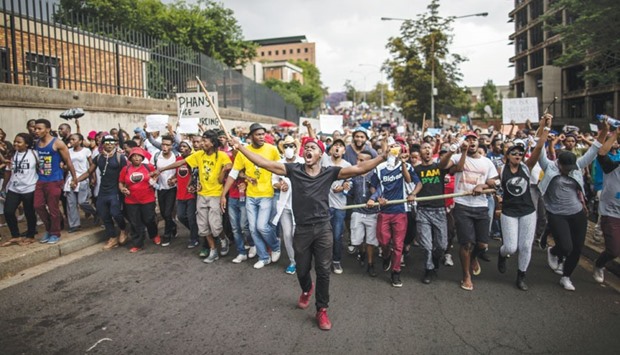Violent demonstrations and arson attacks that burnt down campus buildings forced at least three South African universities to shut their doors yesterday in a new wave of student protests.
Universities have been a focus for unrest in recent months over issues including rising tuition fees, allegations of racism and a dispute over the use of the Afrikaans language.
Several buildings at the North-West University’s Mafikeng campus were torched on Wednesday including a science centre and an administration building which held student records.
President Jacob Zuma condemned the destruction of property on campuses including at University of Free State, University of Pretoria, and the University of Cape Town.
“No amount of anger should drive students to burn their own university and deny themselves and others education,” he said in a statement. “The burning of university buildings at a time when we are prioritising the education of our youth is inexplicable and can never be condoned.”
Police used rubber bullets and tear gas at North-West University to disperse students who left a trail of destruction during a protest.
North-West University spokesman Koos Degenaar told Talk Radio 702 that the violence there began after protesters disrupted a student council meeting, prompting security guards to fire tear gas and rubber bullets to disperse the crowd.
The university said yesterday that the campus was closed indefinitely.
A protest at the University of Pretoria over the use of Afrikaans led to clashes between black and white students, also forcing the university to shut down.
“The university is currently meeting with various student bodies and stakeholders to address the issues affecting learning,” University of Pretoria spokeswoman Anna-Retha Bouwer told AFP.
The Afrikaans language is associated with the apartheid era.
In 1976, black high school pupils in Soweto rebelled against attempts to introduce the language as the medium of instruction, an uprising seen as a major turning point in the fight against apartheid.
University vice-chancellors issued a statement saying that the wave of unrest was organised by groups “to deliberately disrupt and destabilise our universities through intimidation and violence”.
“We also denounce external parties that increase divisions between our students and staff,” it said, referring to radical activists accused of hijacking the students’ protests.
Elsewhere, racial tension flared up at the Free State University in Bloemfontein when a rugby match was interrupted earlier this week.
Black protesters walked in a line across the pitch during the game, before hundreds of white spectators ran on and a mass brawl erupted.
Workers at the campus in Bloemfontein, most of them black, have been protesting to demand an end to outsourcing – when non-teaching services such as cleaning are taken on by private companies.
“The residences were evacuated from the morning and the campus has completely shut down (as) there was too much damage,” a student who declined to be named said.
And at the University of Cape Town (UCT), students are protesting at a lack of adequate campus accommodation.
“UCT has come in for its share of vandalism and violence,” UCT vice-chancellor Max Price said, adding that students threw excrement across the floors of many lecture venues and open spaces in several buildings on Upper Campus.
Last week Price’s office was petrol-bombed, and paintings ripped from walls and burnt.
South Africa has been roiled by a string of racial disputes that have exposed deep divisions more than two decades after the end of white-minority rule.
Last year massive protests by students – many of them so-called “born frees” who grew up after apartheid – pushed the government into abandoning planned tuition fee hikes.
Students at the University of Cape Town also led a high-profile and successful campaign for the removal of a statue of British imperialist Cecil John Rhodes from their campus.

Zuma: No amount of anger should drive students to burn their own university and deny themselves and others education.
